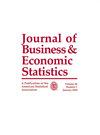基于结果抽样的单调性假设下的因果推理
IF 2.5
2区 数学
Q1 ECONOMICS
引用次数: 2
摘要
我们在病例控制和病例总体抽样下研究因果推理。为此,我们将重点放在二元结果和二元治疗案例上,其中感兴趣的参数是通过潜在结果框架定义的因果相关风险和归因风险。结果表明,强可忽略性并不总是像在随机抽样下那样强大,并且某些单调性假设在明确识别的区间方面产生可比较的结果。具体而言,在单调治疗反应和单调治疗选择假设下,通常的优势比被证明是因果相对风险的一个明确的上界。然后,我们讨论了平均条件(对数)比值比,并提出了一种半参数有效估计算法,当平均仅基于数据中识别的协变量的(条件)分布时。如果协变量的真实总体分布是聚合所需要的,我们也提供了因果推理的算法。我们通过研究社会科学领域的两个实证例子来证明我们方法的有效性:就读私立学校对进入巴基斯坦名牌大学的好处,以及留在学校与卷入巴西贩毒团伙之间的因果关系。本文章由计算机程序翻译,如有差异,请以英文原文为准。
Causal inference under outcome-based sampling with monotonicity assumptions
We study causal inference under case-control and case-population sampling. For this purpose, we focus on the binary-outcome and binary-treatment case, where the parameters of interest are causal relative and attributable risk defined via the potential outcome framework. It is shown that strong ignorability is not always as powerful as it is under random sampling and that certain monotonicity assumptions yield comparable results in terms of sharp identified intervals. Specifically, the usual odds ratio is shown to be a sharp identified upper bound on causal relative risk under the monotone treatment response and monotone treatment selection assumptions. We then discuss averaging the conditional (log) odds ratio and propose an algorithm for semiparametrically efficient estimation when averaging is based only on the (conditional) distributions of the covariates that are identified in the data. We also offer algorithms for causal inference if the true population distribution of the covariates is desirable for aggregation. We show the usefulness of our approach by studying two empirical examples from social sciences: the benefit of attending private school for entering a prestigious university in Pakistan and the causal relationship between staying in school and getting involved with drug-trafficking gangs in Brazil.
求助全文
通过发布文献求助,成功后即可免费获取论文全文。
去求助
来源期刊

Journal of Business & Economic Statistics
数学-统计学与概率论
CiteScore
5.00
自引率
6.70%
发文量
98
审稿时长
>12 weeks
期刊介绍:
The Journal of Business and Economic Statistics (JBES) publishes a range of articles, primarily applied statistical analyses of microeconomic, macroeconomic, forecasting, business, and finance related topics. More general papers in statistics, econometrics, computation, simulation, or graphics are also appropriate if they are immediately applicable to the journal''s general topics of interest. Articles published in JBES contain significant results, high-quality methodological content, excellent exposition, and usually include a substantive empirical application.
 求助内容:
求助内容: 应助结果提醒方式:
应助结果提醒方式:


